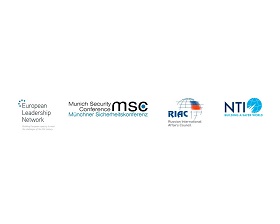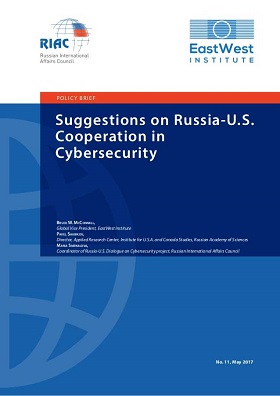Breaking the U.S.-Russia Impasse: Keeping the Door Open to Dialogue
In
Login if you are already registered
(votes: 2, rating: 5) |
(2 votes) |
Professor and Co-Chair of the International and Comparative Politics Department of the American University of Paris
The relations between the United States and the Russian Federation have been deteriorating at a rapid pace. Each nation has been accused of interfering in the domestic elections of the other, making it increasingly difficult for the respective administrations of these states to work cohesively to solve critical problems between the two states. The resolution of these issues, including, but not limited to, debates concerning Russia’s annexation of Crimea, NATO and EU enlargement, and nuclear escalation and the threat of a modern arms race. Though Russia and the United States are in consensus on certain issues, such as the need for containment of the Islamic state and terrorism, the disconnect that results from a lack of coordination both aggravates relations and offers little opportunity for legitimate progress in achieving this goal. The question remains as to how long discussions may continue to falter if each state wishes to solve legitimate issues.
A main issue that exacerbates American-Russian relations is the fact that NATO and the EU have expanded to states that border the Russian Federation, thereby threatening Russia’s self-defined sphere of influence and security. The question is posed as to whether or not it would be possible for Russia, NATO, and the EU to work together in maneuvers such as over flights, joint patrols, and combined peacekeeping operations. Furthermore, the question is raised concerning the possibility for the EU to serve as an intermediary between the US, Russia, and NATO. A main issue noted with this position is the idea that the EU has too many significant ties with NATO, thereby making it not actually a neutral intermediary.
The development and modernization of American ICBMs, nuclear bombers, etc. has also been a point of contention. Russia must balance modernizing its own systems while also preventing the perception that it is beginning an arms race, which would further exacerbate relations. The nuclear systems of other states may also need to be taken into consideration. Related to this issue is the need to quell the threat posed by missile defense systems offered by North Korea. There is a need to answer the question of whether or not it is possible to achieve this multilaterally, instead of through unilateral threats and deployments from the U.S.
The issue concerning Crimea and Eastern Ukraine is additionally extremely important. The US State Department stated that any additional sanctions placed on Russia were only intended to reinforce existing sanctions to motivate Russia to recognize the sovereignty of Ukraine. However, it appears extremely unlikely that Russia will return Crimea to Ukraine in the foreseeable future, effectively halting legitimate conversations and diplomacy between the US and Russia. Other regions of interest include the Southern Caucasus and the Western Balkans.
The ongoing conflict in Syria additionally offers roadblocks to effective US-Russian relations. The question arises as to whether or not the US and the Europeans could find better ways to coordinate their strategy with Russia, Syria, and Iran—and seek out a rapprochement between Saudi Arabia and Iran.
The War against the Islamic State additionally presents issues in the coordination of policies. The conflict poses the question of whether or not the threat of the Islamic state will bring the US and Russia to take a more concerted approach to the resolution of this conflict.
Additionally, there are legitimate political economic concerns that arise as the result of increased American-Russian tensions. The tightened sanctions against Moscow could eventually prove problematic for the deterioration of trade and economic activity that proves to be hurtful on all sides.
The rise of China also poses a critical question: Is Beijing benefiting from US-European-Russian rivalries? Is a Russia-China alliance in the making, or are there significant disagreements between Moscow and Beijing that could create disputes between the two sides? Additionally, there is also the question concerning how the US, EU, and Russia should approach China and India as rising powers.
This essay does not offer the solutions to these many questions. Instead, it aims to raise the important questions so as to engender further thought and discussion to determine how the US-Russia relationship may radically effect how the states can go about shaping strategy and foreign policy.
Relations between the U.S. and Russia appear to be almost at the point of no return 1. Whether justified or not, each side has accused the other of interfering in their respective election processes. Moscow has accused the United States of backing protests that opposed the results of Russia's parliamentary elections in 2011, and of directly interfering in the Russian presidential elections in March 2012 that brought Vladimir Putin to power. Washington has also accused Moscow of interfering in the November 2016 presidential elections that brought Donald Trump to power.
These are serious issues that directly impact domestic politics and popular attitudes. Accusations of interference in the electoral systems raise questions about the legitimacy of the electoral process and about the leaders that are chosen 2. Such issues can make it even more difficult for the respective administrations to reconcile complex issues and disputes.
A number of key issues and disputes are already proving difficult to resolve, not even considering the added problem caused by accusations of mutual election interference. These include security concerns and disputes revolving around NATO and European Union enlargement, Russian actions in Crimea and eastern Ukraine, as well as the nature of the conventional and nuclear arms race that has been escalating at least since the turn of the 21st century.
In June 2017, Moscow canceled talks with Washington in protest against the new political and economic sanctions placed on Moscow for its annexation of Crimea and its political military interference in eastern Ukraine. In the struggle against violent extremism, the U.S., Europeans and Russia generally agree on the need to control the Islamic State. However, there has been a significant lack of coordination that has been further antagonizing relations.
First, NATO-member Turkey shot down a Russian aircraft in November 2015 — an action that tested the NATO-Russia relationship, even if Turkey and Russia eventually came to terms in the aftermath. Then, in early April 2017, the U.S. fired 59 cruise missiles at Syrian airbase on grounds that the Syrian military had allegedly used chemical weaponry 3. The U.S. likewise refused to participate in a conference involving 11 regional actors on the conflict in Afghanistan, which had been sponsored by Moscow on April 14. In June 2017, the U.S. military downed a Syrian aircraft that was purportedly threatening U.S.-backed Syrian Democratic Force militias, which Washington says were fighting the Islamic State. For its part, Damascus claims that its fighter jet was likewise attacking Islamic State forces.
The latter incident led Russian Ministry of Defense to announce that it would suspend the de-escalation discussions with the U.S. and that any Coalition aircraft flying west of the Euphrates River would be tracked and "considered air targets.” By contrast, the U.S. chief of staff of the Air Force claimed that the de-confliction line "remains open… So our hope of course is that we return to a little bit sense of normalcy and we continue to keep the dialogue open.” U.S. Secretary of State Rex Tillerson likewise affirmed that the U.S. remains committed to future discussions about eastern Ukraine and Crimea, as well as Afghanistan.
But given increasingly bitter imprecations, and question remains: For how long will the possibility of dialogue remain open? And how profound will that dialogue prove to be?
This essay will propose some questions for a more profound discussion that is intended to provoke thought about the future of U.S.-European-Russian relationship. These questions seek to keep the door open to a discussion of realistic options that could help lead to the eventual resolution of a number of disputes.
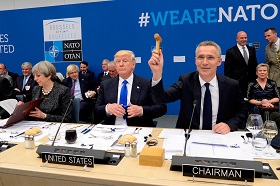
USA and NATO: Who Needs Who?
Geostrategic Concerns
At the roots of the crisis is the fact that NATO and the European Union (EU) have now expanded to states that border the Russian Federation in such a way as to directly or indirectly impact what Moscow considers its “near abroad” — or its self-defined sphere of influence and security.
Moscow initially opposed NATO membership for eastern European states, and particularly to the three Baltic States — which President Boris Yeltsin had previously called a “red line.” Moscow has now made clear its opposition to the further enlargement of both NATO and the EU to Ukraine and Georgia, among other former Soviet-bloc states. Moscow has also opposed the deepening of NATO military infrastructure, including Missile Defense systems, on the territory of new member states. Moscow has likewise been pressuring EU members Sweden and Finland not to join NATO 4.
NATO enlargement in the Baltic region now reinforced since 2014 with the deployment of “rotating” forces, has resulted in a Russian military buildup in northwest Russia and in Kaliningrad. Yet it is highly unlikely that Washington will retract NATO membership for eastern European states that have already joined NATO, despite President Trump’s previous statements that NATO was “obsolete” and his threats not to support NATO members that did not spend 2% of their GDP on defense.
Given the above geo-strategic concerns, what could break the impasse? What could be done to ameliorate tensions between U.S./NATO, EU and the Russian-led Collective Security Treaty Organization (CSTO)?
Instead of engaging in a major military build-up, and as a means to establish security and confidence-building measures, could NATO, the EU and Russia engage in joint over flights, joint patrols, joint military maneuvers and peacekeeping operations through Combined Task Forces, for example, among other options, in the Baltic region?
What would happen if the European Union developed more autonomous defense structures and peacekeeping forces? Could a more integrated EU system of defense and security play a role as an intermediary between U.S./NATO and Russia? Or would the Europeans be seen as too closely linked to the U.S. and NATO?
What would happen if the U.S. and NATO would formally call off the possibility of NATO membership for Ukraine? What if Ukraine was formally made “neutral” so that it could not join either NATO or the CSTO — in accord with Kiev’s own initial claims to be a non-aligned independent state after Soviet collapse?
And what would be the impact on Poland and Baltic States and other NATO members of a formally “neutral” Ukraine?
New Weapons Systems
Prior to Trump’s arrival to power, the Obama administration had already begun the modernization of American ICBMs, cruise missiles, such as the Long-Range Standoff Weapon, and nuclear bombers, such as the B-21 Long Range Strike Bomber. For its part, Moscow has been in the process of developing new ICBMS, such as the RS-28 Sarmat thermonuclear-armed ballistic missile (SATAN 2). Washington has accused Moscow of developing new intermediate range missile systems that purportedly violate the 1987 INF Treaty.
Many of these ICBMs on both sides have been set at 'launch on warning’. Can Washington and Moscow find ways to take these missiles off the status of 'launch on warning’?
It has been proposed that Washington could eliminate its land-based ICBMs and then rely solely on its sea-based and air-based nuclear deterrents 5. How would Moscow, in turn, respond to this proposal, given Russia’s heavy reliance on land-based ICBMs?
What other proposals might also help end a new nuclear arms race? Should the INF treaty and other treaties be updated or expanded to include other states, such as the European states and China?
Washington is also in the process of modernizing its tactical nuclear weapons systems, such as the B-61-12, in part by extending its range. For its part, Moscow has threatened to deploy its Iskander tactical nuclear weapons systems in Kaliningrad and Crimea. Russian nuclear strategy purportedly sees tactical nuclear weaponry as a potential means to “de-escalate” a conventional conflict — as opposed to “deterring” a conventional conflict as in the American strategic perspective.
Is it too much to ask for a total ban on such “tactical” systems that lower the nuclear threshold and could prove ‘easier’ to use? Or, if neither side can agree to banning such weapons altogether, would it be possible to engage in deeper reductions and international inspections?
What if there was a mutual NATO-Russia agreement of "no first use" of nuclear weaponry or other forms of weapons of mass destruction? Could this “no first use” agreement then become accepted internationally as a step toward the elimination of nuclear weaponry?
And should French, UK, Chinese, Indian, Pakistani, and undeclared Israeli nuclear weapons systems be taken into account? How will these countries, plus North Korea and others, respond to the U.S. and Russian conventional and nuclear weapons buildup? And would they necessarily respond positively to U.S-Russian nuclear reductions?
Missile Defenses
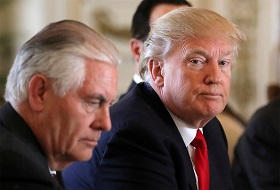
How to Make Russia-U.S. Relations Great Again?
In 2002, the George W. Bush administration unilaterally dropped out of the 1972 ABM Treaty without renegotiating a new accord with Moscow or with other states. For the most part, Moscow has stated that it will respond by asymmetrical means to U.S. Missile Defense deployments and radar systems in Poland and Romania, as well as in Japan, South Korea, and the Middle East.
How might the 2013 Joint Comprehensive Plan of Action (JCPOA) nuclear accord with Iran impact U.S. Missile Defense deployments in Europe — particularly given the fact that Iran’s presumed nuclear weapons program and its missile program primarily justified those deployments.
Can the U.S., Russia, China and Japan find ways to at least freeze North Korea’s nuclear missile capabilities through diplomacy rather than through U.S. military threats and U.S. Missile Defense deployments that are opposed by both China and Russia?
Are these MD deployments needed? Will these MD systems actually work in light of the development of stealth systems and hypersonic weapons, among other devices that could possibly make such MD systems obsolete?
But if Missile Defenses do prove to be effective, at least against some missile systems, is it possible to develop some form of dual key Missile Defense system against third party threats? How can the U.S. best reassure Russia and China that the US deployment of MD systems is not aimed a developing a first strike capability?
Russia–Crimea–Eastern Ukraine
In June 2017, just after the U.S. re-imposed sanctions on Moscow, the U.S. State Department insisted that the new sanctions measures were intended to reinforce existing sanctions and that they were “designed to counter attempts to circumvent our sanctions… Our targeted sanctions were imposed in response to Russia’s ongoing violation of the sovereignty and territorial integrity of its neighbor, Ukraine… If the Russians seek an end to these sanctions… (Then Moscow needs to fully honor) its obligations under the Minsk agreement… (And end) its occupation” of Crimea.
Crimea
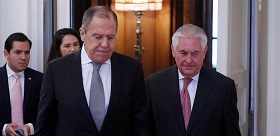
Russia–US Relations: Unstoppable Escalation?
As the above State Department statement indicates, the U.S., NATO and Kiev have demanded that Moscow end its “occupation” and return Crimea to Ukraine. This position appears to represent a major barrier to any possible U.S.-EU-Russian reconciliation and serves to militarize all sides.
As it appears very unlikely that Moscow will return Crimea back to Ukraine, is it possible to imagine any feasible policy alternatives that might be acceptable to both sides and eventually bring about a modicum of peace? Such alternative options would appear to lie somewhere between permitting the conflict to continue to escalate and returning Crimea back to Kiev.
What if the Crimea became a free trade zone—under Russian sovereignty—as form of geo-economic compromise if exchange for an end to sanctions? Could this lead to a reduction in political-military tensions in the region? Would both Moscow and Kiev accept it? What are the possibilities for joint Ukrainian-Russian sovereignty? 6
Eastern Ukraine
As the above State Department statement indicates, Moscow has been blamed for not fulfilling its part of the Minsk accord, but Ukraine has not fulfilled its obligations either.
What are prospects for initiating serious talks between Kiev and the autonomist movements? What are the prospects for a "decentralized" Ukraine? How much autonomy should eastern Ukraine possess? Or will the Donbas region separate from the rest of Ukraine?
Is a new format for the Minsk talks needed? Should the U.S., and possibly Turkey, join the Minsk talks along with Russia, Ukraine, France and Germany?
Would a peacekeeping mission under OSCE auspices prove acceptable if Kiev, Moscow and the eastern Ukrainian autonomists could agree? What would be the conditions needed for both sides to accept peacekeepers, if a settlement can be reached?
Southern Caucasus
Can Turkey now help mediate between the U.S., Europeans and Russia over the disputes in the Caucasus and Black Sea, as well as in Syria? How should the U.S., EU and Russia respond to Ankara’s new turn toward authoritarianism?
What if NATO also dropped efforts to draw Georgia, in addition to Ukraine, into NATO membership? Could the 2008 Turkish proposal for a “Caucasian Stability and Cooperation Platform” be revived for the Caucasus and the entire Black Sea region — if the questions of the Russian annexation of Crimea and issues surrounding the Black Sea and eastern Ukraine can eventually be addressed? Could the U.S. and EU, as well as Ukraine, likewise participate in the creation of a new Caucasus peace and development community?
Can Turkey assist the Europeans, Ukraine and Russia to find a way to cooperate over pipelines and energy disputes? Or what can be done to unleash the tremendous economic potential of the Black Sea region?
Could peacekeeping forces be deployed in Nagorno-Karabakh, for example, where tensions appear to be heating up, or in South Ossetia and Abkhazia, if political settlements could be forged in these regions? Would it be possible to deploy a joint NATO-EU-Russian peacekeeping force, somewhat similar to the peacekeeping deployments in ex-Yugoslavia in 1995, under OSCE auspices, in the southern Caucasus?
And how would this possibility impact the Russian-controlled northern Caucasus?
The Western Balkans
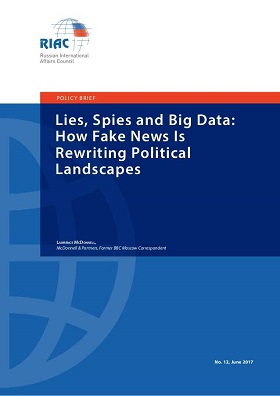
Lies, Spies and Big Data: How Fake News Is Rewriting Political Landscapes
In the aftermath of the break-up of Yugoslavia and NATO’s war “over” Kosovo in 1999, can the Balkans in some way serve as a model of political and inter-ethnic reconciliation for the Caucasus and Black Sea regions?
What will be the impact of Montenegro’s membership in NATO? How will Serbia and other regional states react? How will NATO expansion in this area impact the relations between the U.S., NATO, the EU and Russia? How will it impact the process of inter-ethnic reconciliation and stability in the Balkans?
How is the global refugee crisis in general impacting the Balkan region? What should be done about the massive refugee crisis in general?
Syria and Turkish-Saudi-Iranian Conflict
When a Turkish F-16 pilot shot down a Russian fighter jet in late November 2015, it might have provoked war between NATO and Russia. But international diplomacy helped to defuse tensions, and Turkey and Russia have subsequently worked to improve relations — even if the incident negatively impacted NATO, Russian and Turkish relations.
Turkish-Russian relations were once again tested by the assassination by a Turkish Islamist of the Russian ambassador to Ankara who was key to restoring Russian-Turkish relations. This incident took place just before the planned meeting of Turkey, Iran and Russia over the Syrian crisis and just after the UN Resolution on Aleppo in December 2016.
Now, U.S.-Russian relations have been tested once again by the April 2017 decision of the Trump administration to fire 59 cruise missiles at a Syrian airbase on grounds that the Syrian military had allegedly used chemical weaponry 7. Then, in June 2017, the U.S. military downed a Syrian aircraft that was purportedly threatening U.S.-backed Syrian Democratic Force militias, which Washington says were fighting the Islamic State. For its part, Damascus claims that its fighter jet was likewise attacking Islamic State forces 8.
Can the U.S. and Europeans find ways to better coordinate their strategy with Russia, Syria and Iran — and seek out a rapprochement between Saudi Arabia and Iran? Can Turkey and other states help mediate the Syrian conflict while ultimately bringing the Syrians, Iranians and Saudis into a peace accord?
How should the U.S., Russia, and Europeans deal with the conflict between Turkey, Syria and the Kurds, and between Iraq and the Kurds, given Turkish, Syrian, and Iraqi option to the possibility that the Kurds might use the Syrian conflict to achieve independence in differing regions? Can a loose Kurdish confederation — that does not challenge existing borders — remain a possibility? 9
Will the al-Assad regime be able to regain and sustain control all of Syrian territory? Can at least some of the Syrian opposition work with the Assad regime? Or can al-Assad step back and eventually remove himself from direct rule after a period of time? Could a confederal solution help mitigate demands that Assad step down? Or will Syria break apart?
If a peace settlement can be found — perhaps involving a loose confederation — would it be necessary to deploy a UN peacekeeping force involving different Arab and neutral states?
What is the best international means to support the refugees from Syria and other countries?
War against the Islamic State
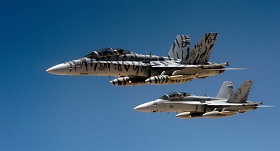
In the Skies over Syria: Rivalry Instead of Coordinated Actions
What is the best way to fight the Islamic State? Will the International Coalition be able to forge a common strategy? Are the states involved in the conflict more interested in defeating the Islamic State or in overthrowing the al-Assad regime?
Can there be a military “solution” to the global war on terrorism? Will the Islamic State movement really be destroyed in Iraq and Syria? Or will it simply drift like a nomad to other regions, into the Russian Caucasus, North Africa, Egypt and the Sinai, southwest Asia and Afghanistan, as well as Kashmir?
How will the entry of the Islamic State into Afghanistan impact the ongoing war between NATO and the Taliban? The U.S. refused to participate in the third round of a conference on Afghanistan that involved 11 regional actors, and that had been organized by Moscow on April 14 2017. Just a day prior to Afghan conference, the U.S. dropped its largest non-nuclear bomb, MOAB, on an Islamic State positions in Afghanistan. In addition to opposing Russian talks with the Taliban, U.S. officials have accused Russia of providing arms to the Taliban, an accusation that has been officially denied by Moscow.
Will it be possible to achieve a more concerted approach, involving both Washington and Moscow, in the Afghan peace talks? Will the threat of Islamic State activities be sufficient to bring Washington and Moscow into a common position?
What will be the impact on major and regional powers of the spread of terrorist activities throughout the ‘wider Middle East’, with periodic attacks in countries throughout much of the world? How should the Coalition against the Islamic State deal with such a scenario?
The Question of Qatar
As the proxy war between Saudi Arabia and Iran intensifies throughout the ‘wider Middle East,’ U.S. and Russian mediation appears absolutely crucial to calm tensions between Saudi Arabia, Turkey and Iran. After Saudi Arabia, the United Arab Emirates, Egypt and Bahrain accused Qatar (and Qatari individuals) of supporting the Moslem Brotherhood and Hamas, among other “terrorist” groups, including the Islamic State — in addition to accusing Qatar of working closely with Iran.
Saudi Arabia’s 13 demands on Qatar — with Turkey backing up Qatar — appear eerily reminiscent of Austro-Hungarian demands on Serbia in July 1914 not to support terrorist groups such as the Black Hand of that epoch. Could conflicts in the wider Middle East,’ much like conflicts in the Balkans prior to World War I, similarly draw in regional and major powers — and then spark a global war? 10
Political Economic Concerns

Qatar Сrisis: What’s Next?
Now that Washington has tightened sanctions against Moscow in June 2017 — in part due to perceived Russian interference in the U.S. presidential elections and in part due to lack of progress on the ongoing conflict in Ukraine — will it eventually prove possible for the U.S., Europeans and Russia to wind down trade and other sanctions that generally hurt all sides, even if unevenly?
Given the negative Russian reaction to the EU Eastern Partnership, and the expansion of EU influence into post-Soviet states, including Ukraine and Belarus, what if EU took steps to bring Russia into a new form of EU partnership? Could the EU and Russia forge new trade and monetary arrangements, for example?
Could both Kaliningrad and Crimea become free trade areas, yet under Russian sovereignty? Would this be of interest to Moscow? Would it help reduce political-military tensions in both the Baltic and the Black Sea regions? 11
What is the best means to advance the social, economic and political development of eastern Ukraine and Crimea?
What should be done about refugee crisis from eastern Ukraine to Russia and from Syria and other countries to the European Union countries? How should Russia and the European Union respond?
Impact of rise of China
China is the elephant in the room, or as Mao might say, the monkey watching two tigers fight. Is Beijing benefiting from U.S.-European-Russian rivalries?
How does Moscow see the rise of China as a political-economic and military power? Is a Russia-China alliance in the making? Or are there significant disagreements between Moscow and Beijing that could create disputes between the two sides?
How should the U.S., EU and Russia approach China and India as rising powers? Can the US, Europeans and Russia forge a common strategy with respect China and India without alienating either? How will Russia’s new rapprochement with Pakistan impact India? Can China play a positive role in the Ukrainian and Syrian conflicts, among other disputes? Could India help mediate between the U.S., Europeans, Japan, Russia and China? 12
Questions Awaiting Resolution
As stated in the introduction, this essay has not been intended to propose solutions, but only to raise some questions that will hopefully provoke a more profound dialogue about the future of U.S.-European-Russian relationship. These questions await responses — and hopefully solutions to a number of disputes. And yet these questions could possibly raise even more questions than responses or solutions. Nevertheless, the purpose is to keep the dialogue open — in the hope that a general U.S.-European-Russian reconciliation can ultimately be achieved.
The risks of a major power war are real, as many of the conditions that provoked major power war in the past appear to be re-occurring. Yet even if a major power war does not take place, a new nuclear and conventional arms race is not in the world’s interests. In the effort to prevent a new arms race, and to prevent the further destabilization of the global system, the U.S., European and Russian leaderships should begin to engage in a sincere and profound dialogue — in working with the other key actors — in a concerted effort to find resolutions to the disputes and conflicts that continue to divide them.
1. Hall Gardner is Professor and Co-Chair of the International and Comparative Politics Department of the American University of Paris. He is the author of Crimea, Global Rivalry, and the Vengeance of History (New York: Palgrave Macmillan, 2015); The Failure to Prevent World War I: The Unexpected Armageddon (Ashgate, 2015); NATO Expansion and the US Strategy in Asia: Surmounting the Global Crisis (New York: Palgrave Macmillan, 2013); The Ashgate Research Companion to War: Origins and Prevention, primary editor with Oleg Kobtzeff (Ashgate, 2012); Averting Global War: Regional Challenges, Overextension, and Options for American Strategy (New York: Palgrave, 2007). American Global Strategy and the War on Terrorism (Ashgate, 2005; revised and updated, 2007). The author would like to thank Roberto Savio, John Maresca, and Negoslav Ostojic for their input and suggestions on this essay; yet the views expressed are the responsibility of the author alone.
2. See for example, David Frum, “What Happens When a Presidency Loses Its Legitimacy?” The Atlantic (June 23, 2017) https://www.theatlantic.com/politics/archive/2017/06/what-happens-when-a-presidency-loses-its-legitimacy/531447/?utm_source=nl-atlantic-daily-062317 3. Daniel Lazare, “Luring Trump into Mideast Wars” Consortium News (April 8, 2017) https://consortiumnews.com/2017/04/08/luring-trump-into-mideast-wars/; Seymour Hersh argues that “poison gas” was caused by secondary explosions and not by the chemical weaponry, see “Trump’s Red Line” De Welt https://www.welt.de/politik/ausland/article165905578/Trump-s-Red-Line.html4. See Hall Gardner, Crimea, Global Rivalry and the Vengeance of History (New York: Palgrave Macmillan, 2015); NATO Expansion and the US Strategy in Asia: Surmounting the Global Crisis (New York: Palgrave Macmillan, 2013); Dangerous Crossroads: Europe, Russia and the Future of NATO (Westport, CT: Praeger, 1997);
5. Julian Borger, “James Mattis warned that land-based nuclear missiles pose false alarm danger” The Guardian (4 December 2016) https://www.theguardian.com/us-news/2016/dec/04/james-mattis-defense-secretary-nuclear-missiles-trump
6. Hall Gardner, “Ukraine: A New Plan” American Affairs (Summer 2017, Volume I, Number 2)
7. Daniel Lazare, “Luring Trump into Mideast Wars” Consortium News (April 8, 2017) https://consortiumnews.com/2017/04/08/luring-trump-into-mideast-wars/; Seymour Hersh argues that “poison gas” was caused by secondary explosions and not by the chemical weaponry, see “Trump’s Red Line” De Welt https://www.welt.de/politik/ausland/article165905578/Trump-s-Red-Line.html
8. Tom O’Connor, “West Needs Russia’s Help to Fight ISIS and Assad can Stay, France’s Macron” Newsweek (June 21, 2017) http://www.newsweek.com/west-need-russia-help-fight-isis-assad-stay-macron-628119; Amberin Zaman, “Kurds no safer after US shoots down Syrian jet” Al-Monitor (June 20, 2017) http://www.al-monitor.com/pulse/originals/2017/06/us-shoots-down-syrian-fighter-jet-ypg.html
9. “Iraqi Kurdish leader calls for non-binding independence referendum” Reuters (Feb 2, 2016) http://www.reuters.com/article/us-iraq-kurds-idUSKCN0VB2EY “PKK leader slams KRG's referendum, says 'Kurds don't need a state’ Daily Sabah (June 22, 201è) https://www.dailysabah.com/politics/2017/06/22/pkk-leader-slams-krgs-referendum-says-kurds-dont-need-a-state Masoud Barzani, the president of the Kurdish Regional Government, has threatened to hold a referendum in September 2017 to break away from Iraq—a position which is actually opposed by the Turkish PKK and its imprisoned founder Abdullah Öcalan who has argued that “It is possible to build confederate structures across all parts of Kurdistan without the need to question the existing borders.” This approach represents a compromise between demands for total independence and total assimilation. See my argument in American Global Strategy and the ‘War on Terrorism’ and my interviews in Iraqi Kurdish: Hall Gardner, Digital Gulan (December 2007); and Hall Gardner, Interview with Ferhad Mohammed, “Questions on the Philosophy of Revolution” Digital Gulan (September 2011): “I do not believe in the formula that an independent nation-state and national identity automatically means Liberty…. The problem then is how to establish democratic forms of governance within the same ethnic community or identity group while also engaging in power sharing arrangements with other minority groups and with neighboring countries. Rather than seeking national independence, a loose confederation of autonomous regions can be the goal.” (from Gardner’s original text)
10. Erdoğan rejects Saudi demand to pull Turkish troops out of Qatar https://www.theguardian.com/world/2017/jun/25/erdogan-rejects-saudi-demand-to-pull-turkish-troops-out-of-qatar For a comparison of causes of World War I with today, see Hall Gardner, The Failure to Prevent World War I: The Unexpected Armageddon (Ashgate, 2015) and Hall Gardner, Crimea, Global Rivalry and the Vengeance of History (Palgrave-Macmillan, 2017)
11. Hall Gardner, Crimea, Global Rivalry, and the Vengeance of History (Palgrave Macmillan, 2015) and Hall Gardner, “Ukraine: A New Plan” American Affairs (Summer 2017, Volume I, Number 2)
12. See my argument, Hall Gardner, World War Trump: The Risks of America’s New Nationalism (Prometheus Books: 2018 forthcoming.)
(votes: 2, rating: 5) |
(2 votes) |
Executive Summary of the CSIS and RIAC Report
Russia–US Relations: Unstoppable Escalation?The chemical incident in Idlib brought to nothing all the last months' efforts, aimed to normalize the situation in Syria
How to Make Russia-U.S. Relations Great Again?Russia and the United States do not have any reasons to be enemies
Suggestions on Russia-U.S. Cooperation in CybersecurityRIAC and EWI Policy Brief
Open Letter to President Donald Trump and President Vladimir PutinAuthors: Des Browne, Wolfgang Ischinger, Igor S. Ivanov, Sam Nunn
In the Skies over Syria: Rivalry Instead of Coordinated ActionsInterview with Aleksandr Aksenenok


